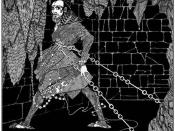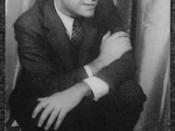Edgar Allen Poe's "The Cask of Amontillado" is a carefully crafted tale about revenge. The story takes place in Italy during carnival festivities. Montresor is our sinister narrator who explains how his friend, Fortunato, has deeply insulted him. The reader is never told what Fortunato did to make Montresor want to kill him, so we don't really know if the main character is reliable or not. All we know is that Montresor wants Fortunato dead, so he plans to use Fortunato's main weakness, his insistence that he is a wine connoisseur, to entrap and kill him. In the "The Cask of Amontillado," Edgar Allen Poe uses irony to underscore Montresor's insidious revenge.
Irony, both dramatic and verbal, plays a very important role in "The Cask of Amontillado." Dramatic irony is when the reader knows something that the characters in the story do not and verbal irony is when a character says one thing but means something else.
Firstly, the story starts out at a carnival; this in itself is ironic, because a horrible crime is about to happen during a celebratory time. Montresor tries to hide his grotesque deed during a time filled with happiness. In addition, our victim, Fortunato, is wearing a clown's costume. This is very suiting for him since Montresor intends to make a fool out of him as part of his demise. Creatively, Poe gives the victim the name, Fortunato, but he is anything but fortunate which sets the ironic tone of the story. Montresor explains that he is deeply insulted by his friend Fortunato and intends to kill him; however, he will not show any form of anger: "...neither by word nor deed had I given Fortunato cause to doubt my good will. I continued, as was my wont, to smile...


